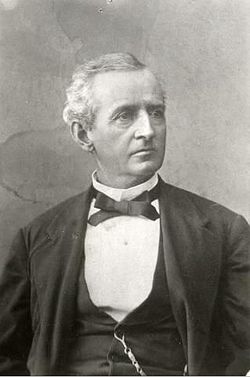Get Today in Masonic History into your Inbox. Sign up today for one of our email lists!
Need an article for your Trestleboard/Newsletter see our Use Policy
Samuel Beach Axtell is Born

Today in Masonic History Samuel Beach Axtell is born in 1819.
Samuel Beach Axtell was an American jurist and politician.
Axtell was born in Franklin County, Ohio on October 14th, 1819. He graduated from the Western Reserve College in Oberlin, Ohio. He was admitted to the Ohio bar in the 1830's.
In 1843, Axtell moved with his wife to Mt. Clemens, Michigan.
In 1851, Axtell headed west and got caught up with he California Gold Rush. He was largely unsuccessfully in his efforts mining gold along the American River. When California organized it's counties, Axtell became interested in politics and served three terms as the district attorney of Amador County. By 1860, he had moved to San Francisco. He ran for United States Senate and was elected in 1866. He served two terms and declined to run for a third since he had changed his party affiliation from Democrat to Republican.
In 1874, President Ulysses S. Grant tapped Axtell to be the governor of the Utah Territory. Shortly after in 1875 he was appointed the governor of the New Mexico territory a more esteemed position. Unfortunately his time as governor in the New Mexico territory was marked by corruption, fraud, mismanagement, plots and murder. The final straw for his governorship came in 1878 when he put forth a proclamation declaring that he had no paper to make a proclamation. Obviously untrue, the story was covered by eastern newspapers. The investigation turned up so much corruption that Axtell was suspended and President Rutherford B. Hayes named a new governor. Axtell never faced any criminal charges, despite the corruption.
Despite his issues as governor, Axtell would be appointed to the New Mexico Territorial Supreme Court in 1882. He resigned in 1885 when it was clear that President Grover Cleveland was going to replace him.
It was as a judge that Axtell truly excelled. He was very much about justice for all parties in any matter that came before the court. Although quite often he was dictatorial in his actions. He frequently rejected the jury's verdict if he disagreed with their findings. One such case was when a young farmer (the defendant) was in danger of losing his land and could not afford an attorney. When Axtell saw that the young man was going to lose he stepped down from the bench, looked at the jury and said "It takes thirteen men to steal a poor boy's farm in New Mexico." He then cross examined the witness himself. He ordered the jury to find in favor of the defendant. When the jury foreman argued with Axtell he dismissed the jury and ordered the sheriff to never allow any of the jurors to sit on a jury again. Although very dictatorial the case is seen by many as supporting the common good.
In another case Axtell was threatened. He was told that if he sat on the bench for a case he would be killed. Before the start of the trial, he ordered the sheriff to search everyone in the court room. If they were found to have a firearm on them he charged them $10 for contempt of court. When the search was done, there was a pile of 42 guns on the table. The case was heavily covered by the press and was declared a "triumph of law over lawlessness."
Axtell passed away on August 7, 1891.
Axtell was a member of Amador Lodge No. 65, Jackson, California.
This article provided by Brother Eric C. Steele.

